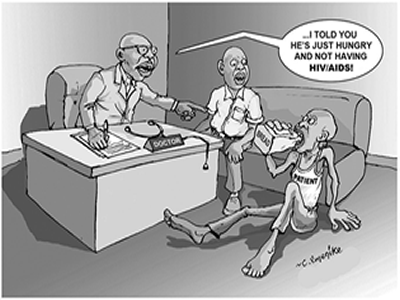
One sure way of gauging a people’s humanity and compassion is how they treat their senior citizens and the recent verification exercise of former Nigeria Airways workers once again highlighted, very forcefully, the pain and anguish Nigeria visits on its senior citizens.
Old people, some of them in their 80s, were compelled to come out in large numbers for the exercise. The sight of these senior citizens, some in wheel chairs and crutches, others assisted by their children and grandchildren, was heart-wrenching, to say the least.
Children of deceased former workers also came to claim what rightly belongs to their parents. Expectedly, there was a huge crowd, which stretched the unions and officials from the Ministry of Finance in their effort to instil orderliness into the entire exercise. Since the liquidation of the national carrier many years ago, these retirees who spent their youth working for the country, had been poorly treated. For 15 years they waited in vain for their severance payment. That it took so long for the retirees to get their entitlements is a major problem in itself and speaks of the country’s attitude to such matters.
Majority of the former workers came from different parts of the country. And dragging these senior citizens to Lagos from all over the country where they are spending their last days is callous and unfeeling. Seeing these seniors, some lying down on bare floor, some with heads bowed in tiredness and yet others almost dying of exhaustion, is a disgrace to the nation. Unfortunately, we have lost our sense of shame.
Upon liquidation of the airline in 2003, foreign staff domiciled in the United States and Europe were paid 22 years benefits in accordance with the International Labour Organisation (ILO) regulations while a handful of their counterparts in Nigeria were paid for only five years. But retirement benefits of Nigerian staff were left unpaid up till now. We cannot help but note this unequal treatment and disparity. What informed such differential treatment at that time? Whatever the reason, it was unjustifiable and wrong to have paid a set of employees while leaving out others who obviously were in the majority. This majority have, as a consequence, lived in penury since.
Indeed, at the beginning of the exercise, one retiree reportedly died. He was brought from his hospital bed to the verification centre in an ambulance. The poor man didn’t survive the rigours of the journey and lost his life in the process of trying to get his entitlement.
It is difficult to understand the reason why family members of this particular ex-worker of Nigeria Airways removed their ailing relative from the hospital to the verification venue. Why the urgency given that the man was already gravely ill? Now what happens to the deceased’s money? How easy would it be for the family to get the money seeing that the man couldn’t go through the verification process?
While we note that removing the deceased from the hospital was ill-conceived, we must also note that it is time government reviewed its insistence on retirees physically appearing for such verifications. Many old people who live in retirement in far-flung places had been compelled to travel to Abuja for such exercises in the past and in some instances lost their lives in the process.
The question therefore is, is it impossible to decentralise these verification exercises so that retirees can go to the capital cities of their states and do whatever needs to be done rather than compel them to make the often perilous journey to Abuja? Is it not easier, for instance, for an old man who resides in Onitsha to travel to Awka, the Anambra State capital, for verification rather than Abuja.
The rigidity of authorities with regard to conducting verification exercises in Abuja or Lagos, as the case may be, has led to needless deaths. Having served their fatherland in their youth, the least the country can do is to ensure that their twilight years are not spent in anguish, pain and regrets.
Again, is it impossible, for instance, to have close family members of retirees to carry out such verifications for their old relatives? Why can’t a son or daughter do the exercise on behalf of their father or mother? Authorities may have reservations about this approach as it could be fraught with risks. It could be abused. This is understandable, but it is not insurmountable. Very stringent and rigorous procedures can be put in place to guard against attempts to circumvent the process. Family members of retirees would have to provide, for instance, fool-proof documents and evidence of their relationship with the claimant.
It is trite to repeat here that you don’t need to reinvent the wheel. How is it done elsewhere? It will not take anything to ascertain how such matters are handled in developed countries; all we have to do is copy the formula and adapt it to suit our environment and peculiarities.
END

Be the first to comment